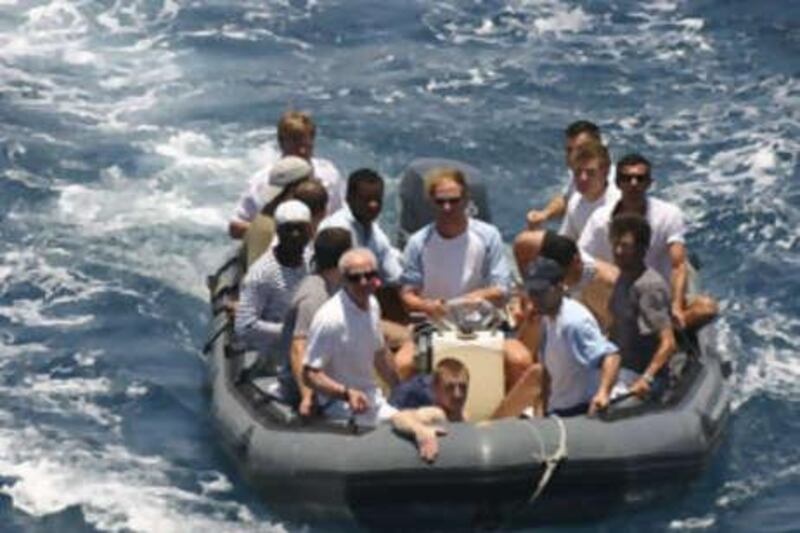MOMBASA, KENYA // When a ship is hijacked in the Indian Ocean, governments, shipping companies and aid agencies call Andrew Mwangura, the head of the Seafarers' Assistance Programme. Mr Mwangura is an expert in piracy in the region, especially off the coast of Somalia, and his aid group has been involved in securing the release of 90 per cent of the vessels taken captive there. "We talk to the pirates and hear what they want," he says.
Working from a small office in Mombasa, the largest port on the steamy coast of East Africa, Mr Mwangura and nine volunteers use their contacts in the maritime world to locate missing ships. The organisation does not have fancy radar or satellite tracking software like some government security agencies. A few mobile phones and a radio are all they need. "We can't afford equipment, but we work better than those who have all of the equipment," Mr Mwangura says. "People don't trust the government; they trust us. That's why they contact us first."
The vast majority of piracy acts in the Indian Ocean are off the coast of Somalia, where a 17-year civil war has created a lawless state. The semiautonomous region of Puntland in northern Somalia sits at the entrance to the Gulf of Aden, which forms a bottleneck into the Red Sea. Any ship travelling from the Mediterranean Sea to the Indian Ocean must pass through these pirate-infested waters. Piracy in Somalia started out as a group of local fishermen protecting their territorial fishing waters, but has evolved into a commercial enterprise as some companies pay up to US$2 million (Dh7.3m) in ransom to secure the release of their boats.
After the collapse of the central government in 1991, Somalia was left with no navy and had no means of issuing fishing permits or fighting illegal fishing in its waters. Maritime militias seized international fishing boats to demand payment for fishing rights. "In the beginning, the pirates were fighting for their rights," Mr Mwangura says. "They only targeted fishing vessels. Once they started getting paid, they started hijacking other vessels. Illegal fishing is the root cause of piracy in Somalia."
The pirates are well organised, well armed and well funded, he adds. "The ones holding the guns on the boats, they are just young boys; they are not pirates. The real pirates are living in big houses in Canada, the UK and here in Mombasa. It's a well-organised syndicate." Mr Mwangura claims that Somalis living abroad are funding and arming bands of pirates. These wealthy backers take most of the ransom money while the pirates who take the hostages get a few hundred dollars.
"We are trying to tell people to please stop paying ransom," Mr Mwangura says. "When you pay them, you are collaborating with them. Paying them encourages them." There have been 25 incidents of piracy off Somalia this year, the same number as all of last year, according to the International Maritime Bureau. This week, Somali pirates hijacked a Japanese ship carrying lead and zinc. At least two UAE-owned ships have been hijacked this year.
"Somalia does not have any form of solid government. It does not have sufficient resources to police its waters," said Cyrus Mody, a manager at the International Maritime Bureau. "The pirates have realised that hijacking of vessels is a very lucrative business. That has made them a bit more bold in their actions. Paying large ransoms has enticed them to carry out attacks even more." Mr Mwangura helped negotiate the release of the 30-member crew of a French luxury yacht, Le Ponant, which Somali pirates held for seven days in April. The ship's owner was reported to have paid a $2m ransom.
After the crew was released, French commandos raided the ship, arrested six of the pirates and recovered part of the ransom money. Pippa Hayward, the girlfriend of one of the French crew members taken hostage, said sailors fear passing the coast of Somalia because of the threat of pirates. "They know the dangers," she said in a telephone interview with The National. "They talk about having to black out the windows when they are off the coast of Somalia."
Pirates recently hijacked a UN World Food Programme vessel delivering much needed food aid to Somalia, where a million displaced people face the threat of famine. In response to this and other acts of piracy, the UN Security Council passed a resolution in June allowing some countries to pursue and arrest pirates in Somali territorial waters. However, the UN resolution has failed to intimidate Somali pirates, Mr Mwangura says. "Within two weeks [of the resolution passing], they hijacked three ships and demanded more money than ever before, and they were paid." The pirates, he says, "were sending a message that the resolution doesn't mean anything to them".
Mr Mwangura, who makes his living as a consultant on maritime issues, travels the world giving talks on piracy and maritime safety. He is writing a book on Africa's coastal waters and how they contribute to instability on the continent. He says most of the drug smuggling, gun running and illegal resource extraction is done by boat, and the proceeds go to fund Africa's civil wars. "All the instability in Africa is connected with the sea."
@Email:mbrown@thenational.ae





